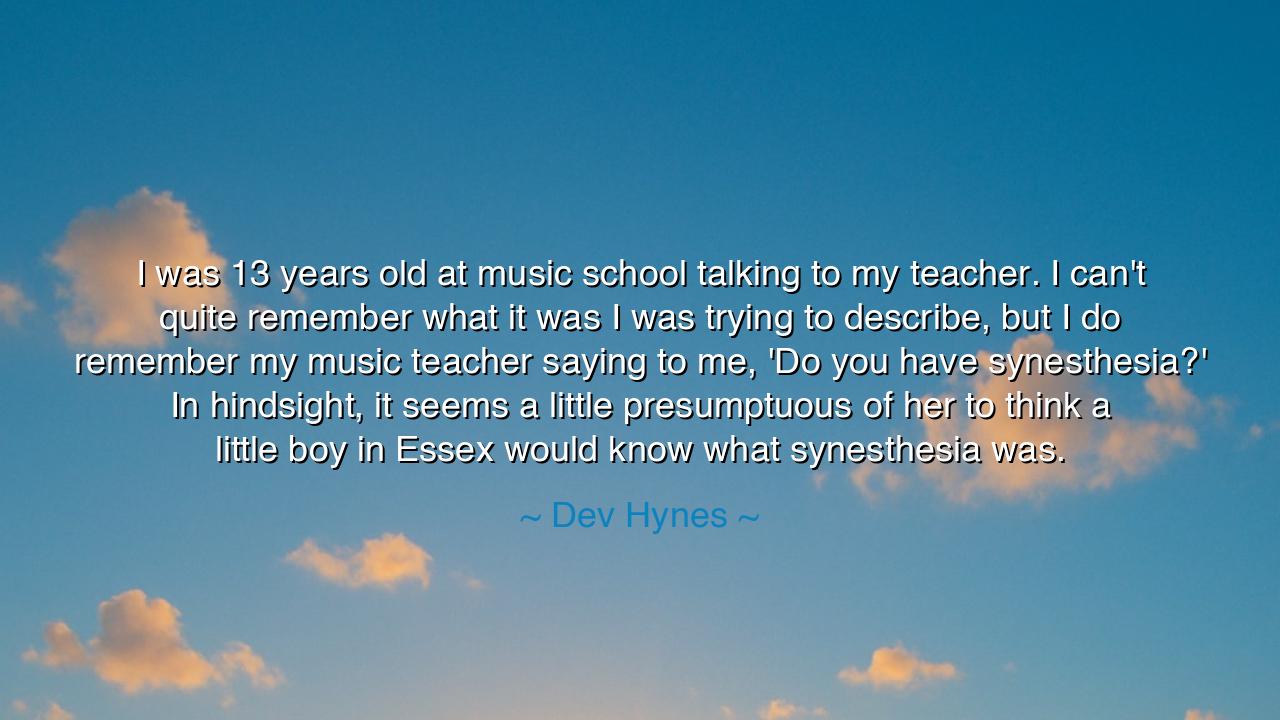
I was 13 years old at music school talking to my teacher. I
I was 13 years old at music school talking to my teacher. I can't quite remember what it was I was trying to describe, but I do remember my music teacher saying to me, 'Do you have synesthesia?' In hindsight, it seems a little presumptuous of her to think a little boy in Essex would know what synesthesia was.






Hear the recollection of Dev Hynes, musician and visionary, who spoke thus: “I was 13 years old at music school talking to my teacher. I can’t quite remember what it was I was trying to describe, but I do remember my music teacher saying to me, ‘Do you have synesthesia?’ In hindsight, it seems a little presumptuous of her to think a little boy in Essex would know what synesthesia was.” These words are both gentle and profound, for they unveil the mystery of perception, the innocence of youth, and the awakening of awareness that sometimes comes from the insight of others before it is known to ourselves.
At the heart of this memory is the notion of synesthesia, the strange and wondrous mingling of the senses. To those who bear it, colors may be heard, numbers may glow with shades of light, and music may ripple across the mind like a rainbow in motion. What seems impossible to the many is natural to the few. For young Hynes, at 13, he was merely trying to give voice to an experience beyond ordinary language, and it was the teacher who recognized that something rare might be stirring in the boy’s description. This is the power of mentors—to see in us what we ourselves do not yet have words to name.
Such encounters remind us of the timeless dance between youth and guidance. The teacher, seasoned by experience, looks upon the uncertain words of the child and perceives hidden treasure. Like Socrates, who drew wisdom from his students by asking questions that pierced beyond the obvious, so too did this music teacher glimpse a doorway into Hynes’s inner world. And though it may have seemed “presumptuous,” as he later reflected, it was also prophetic—for his career as a musician would be shaped by his unusual sensitivity to sound, color, and emotion.
History offers us similar tales. Consider Wassily Kandinsky, the great painter, who claimed to see colors when hearing music. His synesthetic vision gave birth to a new language of art, where shapes and hues were orchestrated like symphonies upon the canvas. What for others was invisible became, through him, the foundation of abstract painting. Or think of Alexander Scriabin, the Russian composer, who created music meant to be accompanied by colored lights, seeking to fuse the senses into one grand experience. These figures, like Hynes, remind us that the boundaries of perception are not fixed, but open to expansion.
Yet the deeper meaning of Hynes’s reflection is not only about the marvel of synesthesia, but about the importance of being recognized, especially in youth. For how many children speak of visions or feelings they cannot explain, only to be dismissed? How many budding artists or thinkers might have bloomed, had someone cared to listen with patience instead of brushing them aside? The true greatness of a teacher lies not in filling the student with knowledge, but in noticing, nurturing, and naming the gifts that lie hidden, waiting to awaken.
The lesson here is both tender and mighty: listen deeply to the words of others, even when they stumble, even when they do not yet know how to describe what they feel. Often there lies within those words a glimpse of wonder, a spark of genius, or the seed of a gift that may one day change the world. And for those who carry unusual perceptions or sensitivities—do not doubt them, even if others cannot yet understand. What sets you apart may be the very thing that gives you your voice.
Practical steps follow: if you are a teacher, be alert not only to what is correct, but to what is unusual, for therein lies originality. If you are a student, hold fast to your experiences, even if they seem strange, and trust that they may one day become your greatest strength. And if you are simply a traveler in life, remember that every soul you meet may perceive the world differently—listen with humility, and you may learn to see through new eyes.
Remember always: at 13, Hynes did not know the word, but he carried within him the experience. It took a teacher to speak it aloud, and years later, he saw the truth of it. So too is life for all of us: we often do not know the names of our gifts until another calls them forth. Let us, then, be both the seekers of such recognition and the givers of it, so that no hidden treasure of the soul remains buried in silence.






AAdministratorAdministrator
Welcome, honored guests. Please leave a comment, we will respond soon